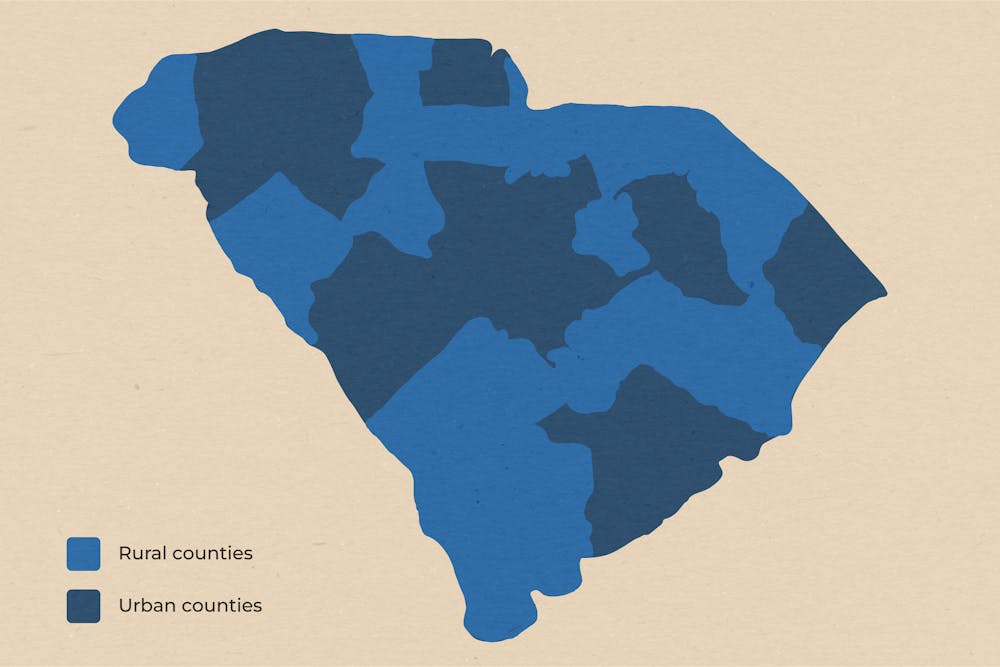Yatin Narella was looking for a way to learn more about rural areas in South Carolina when he came upon a newly formed student organization, the Rural Interest Group.
His roommate, who founded the organization in 2021, told him about the group, and Narella joined shortly after.
"It became a way for me to learn a lot more about the communities around us in South Carolina, as well as just gain important leadership experiences," Nerella said.
Two years later, Nerella, a fourth-year biological sciences student and now president of the organization, is finding new ways for USC students to assist rural communities in South Carolina.
The Rural Interest Group is focused on educating students on current issues in South Carolina's rural cities. While several of these issues relate to healthcare, the group also covers subjects such as education, economics and infrastructure.
The group hosts monthly meetings and pushes for its members to join causes related to working or helping in rural communities. In the brief time the student organization has been established, many of its members gained accomplishments in their endeavors to help rural South Carolina.
Rural Interest Group Secretary Aastha Arora and one of the two Vice Presidents Thrisha Mote were two of four USC Honors College students who won the statewide Pay it Forward competition last March for presenting a solution to period poverty.
The Pay it Forward competition, hosted by Electric Cooperatives of South Carolina, seeks to find solutions to economic and social issues in South Carolina’s rural areas, granting a $5,000 cash prize to its winner.
Outside of competitions, the group intends to raise awareness so its members will know how to help with issues wherever they go after graduation, Nerella said.
While Nerella started as a regular member, he went on to take the treasurer position, and then the presidential position among Rural Interest Group's officers. Working on Rural Interest Group's executive leadership entails finding speakers to bring their perspectives and knowledge of rural South Carolina to their members for each meeting.
"We try to be pretty low commitment, just because of trying to be with everyone's schedule," Nerella said. "So we do once a month ... usually the first Monday. Sometimes if we can't find a speaker, we'll switch to the second Monday, but main goal is once a month meetings with speakers."
Nerella said he wants to make Rural Interest Group is more accessible to current and future members.
For the 2023-24 academic year, he plans to include more virtual meetings and host more events with the organization. But he has already started making steps towards his goal.
“We got rid of dues," Nerella said. "The old president and I decided that as a rural club dedicated to raising awareness and serving the underserved, dues seemed a little contradictory.”
Many students in the group come from a wide range of households in rural, suburban and urban areas of South Carolina, including third-year pharmacy student and Vice President Christina Lin.
Lin joined the group as a requirement to complete her rural health track for her pharmacy degree. But she was able to find more meaning in her time there, prompting her to run for one of the two vice president positions, she said.
“I'm actually from Lexington, so I'm not (in a) very rural area, but my parents recently moved to Aiken, which is pretty rural — maybe compared to other parts of South Carolina, not as much," Lin said. "But the patient population there is pretty underserved."
Throughout her time living in a rural area and working in pharmacy, she said she has noticed the scarcity of doctors’ offices in these areas as opposed to Columbia. While Columbia may have several doctors' offices available for citizens to choose from, rural areas may only have one in the area, she said.
“I feel like pharmacists play an important role in helping ease that disparity in a way because they can also provide clinical support rather than just being a doctor doing everything,” Lin said.

Kevin Bennett and Cassandra Pope serve as the director and the strategic workforce and training manager, respectively, for the South Carolina Center for Rural and Primary Healthcare.
Bennett and Pope help Rural Interest Group recruit speakers and find new ways for them to increase their awareness for themselves and others. But Bennett said he wishes to have the group further influence the communities outside of regular meetings.
“I think we would love to try to get the students involved in the RIG, more directly engaged and connected with rural communities,” Bennett said. “It's difficult, because it's just difficult to travel. It's expensive, logistics, all those sorts of things. But I think having that service, learning direct knowledge experience, is extremely vital. A big principle of ours is going to the communities and listening to them and hearing from them. We will learn a ton that way.”
Anyone can help rural communities both inside and outside of the organization by leaving Columbia and seeing those communities themselves, he said.
“What you can do for rural South Carolina is go visit it," Bennett said. "Go spend some money there. We have some really cool towns and communities in the state that are — I mean, everything in the state is two hours from Columbia, basically, right? You can drive an hour from here and get to a little downtown that has cute little shops and parks and state parks nearby, a waterfall, a café.”
Alongside the progress the organization has made so far, the organization’s leaders have several plans made for Rural Interest Group's future, including networking outside of the university.
“Right now, I think one of the biggest things I want to do as president, which is something we've kind of neglected to do, is really get involved outside of just Columbia. Obviously, this is difficult, because transportation and whatnot, but trying to find avenues,” Nerella said.
While Nerella is currently focused on increasing events and networking throughout the school, Bennett and Pope said they want to expand Rural Interest Group to other schools.
“Cassandra and I have talked a lot about setting up RIGs in all the universities in the state,” Bennett said. “Clemson makes a ton of sense, right? But really all of them, they have rural students. Why not do this all across the state and then have this network of RIGs that the students can talk to?”

